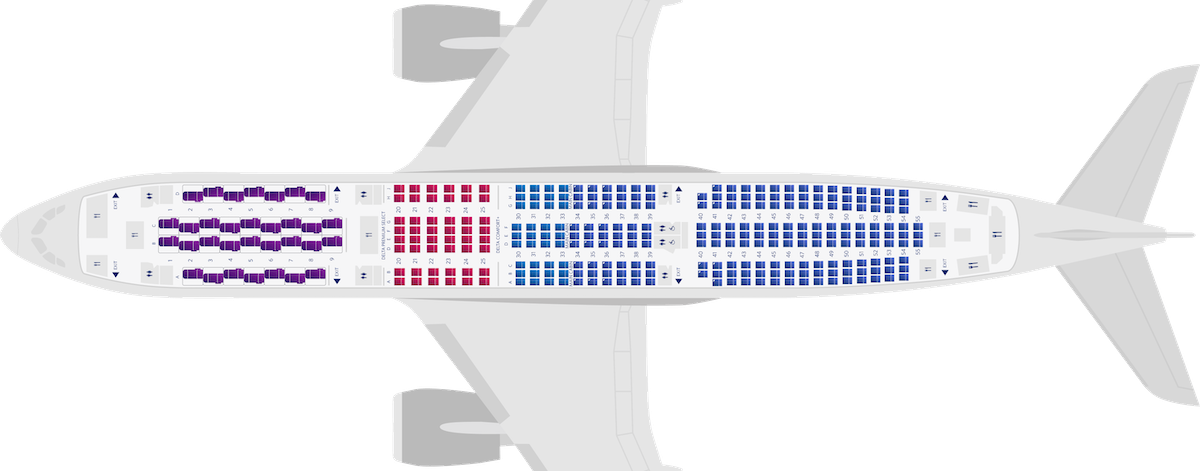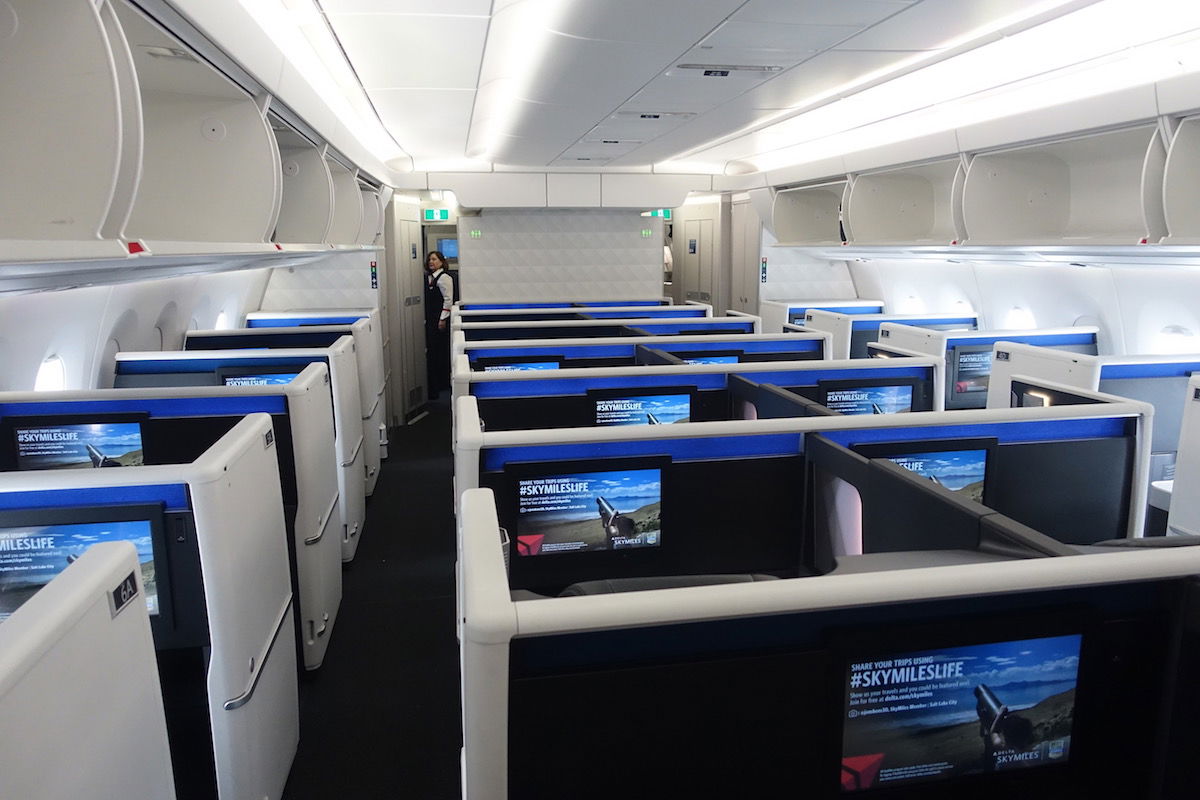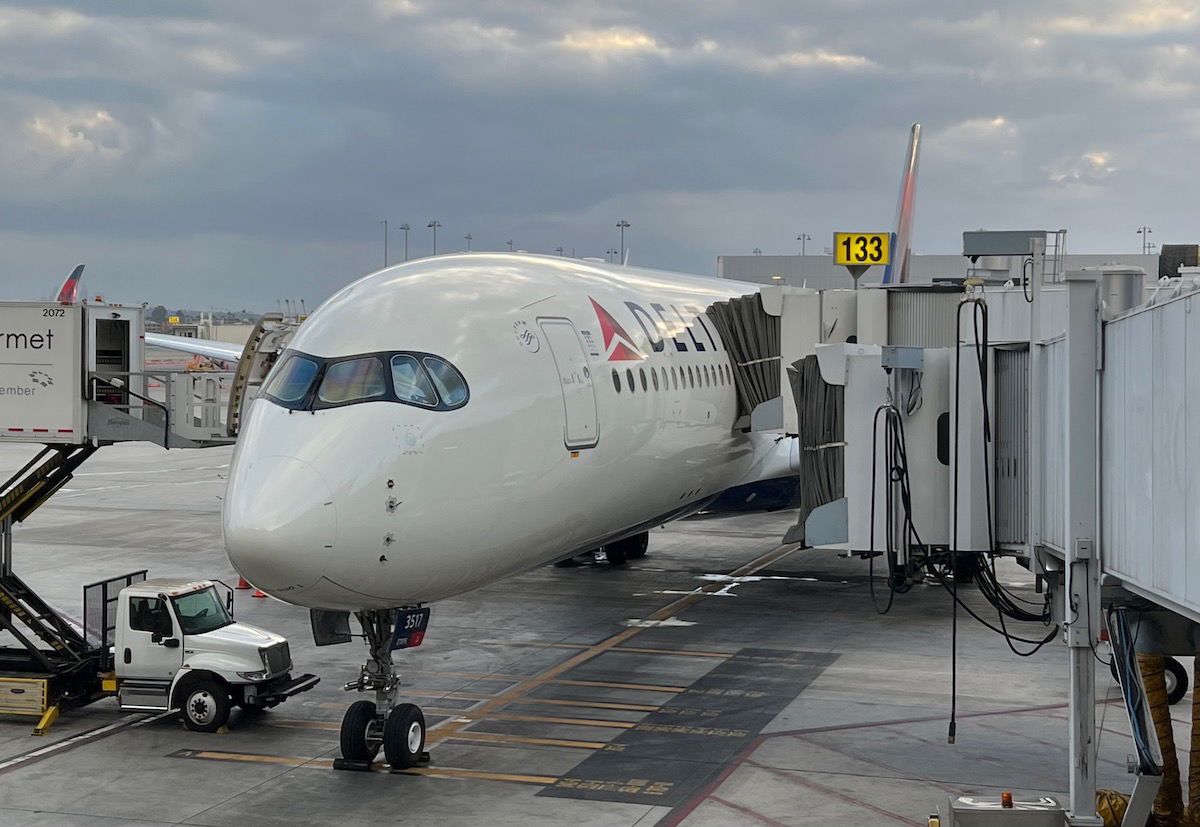Delta Air Lines will be introducing a new, more premium layout on some of its upcoming Airbus A350s. While seat maps began to reflect this back in December 2023, the airline has now formally announced these plans.
In this post:
Delta plans A350s with more business class seats
Delta intends to introduce a new premium configuration on some of its Airbus A350-900s, featuring more business class seats. For context, Delta currently has 29 A350s in its fleet, with an additional 15 of these jets on order. Currently, Delta has its standard A350 layout, plus it has a special, less premium layout on some aircraft that were acquired from LATAM.

For some of its upcoming A350 deliveries, the airline plans to introduce a different layout. Specifically, the jet’s overall capacity is decreasing by 31 seats, from 306 seats to 275 seats, with the breakdown of seats changing as follows:
- Delta One (business class) is going from 32 seats to 40 seats, as it gains two additional rows of seats behind the second set of doors
- Delta Premium Select (premium economy) is going from 48 seats to 40 seats, as it loses one row of seats
- Delta Comfort+ (extra legroom economy) is maintaining 36 seats
- Delta Main Cabin (economy class) is going from 190 seats to 159 seats, as a few rows of seats are being eliminated
As you can tell, Delta is swapping eight premium economy seats for eight business class seats, and in the process is losing 31 economy seats.

Delta has announced the first two routes that are expected to get this new configuration:
- Atlanta (ATL) to Johannesburg (JNB) should see premium A350s as of as of June 20, 2024
- Atlanta (ATL) to Cape Town (CPT) should see premium A350s as of September 9, 2024
However, Delta hasn’t yet revealed how many A350-900s are expected to get this layout, so it remains to be seen if this layout will be installed on all newly delivered A350s, or just a handful of them. And of course this says nothing of Delta’s order for A350-1000s, which will join the carrier’s fleet as of 2026.
Why Delta is changing its A350 configuration
While Delta is generally able to command a revenue premium among US airlines, the airline is conservative about the size of its premium cabins, especially on long haul flights. For example, the A350 is Delta’s flagship aircraft, and the airline currently just has 32 business class seats on those planes.
Meanwhile United’s 777-300ERs have 60 business class seats and United’s 787-9s have 48 business class seats. So it’s interesting to see the different strategies the two airlines take. I’m not sure if Delta just isn’t able to sell as many business class seats as United, or if Delta believes it can command the highest fares with these smaller premium cabins.
So, is Delta increasing the size of its A350 business class cabin a general trend shift, or is there more to it? Delta’s Atlanta to South Africa routes are the carrier’s two longest flights, and the airline often has weight restrictions on the westbound flights, especially when departing Johannesburg (which is at a high altitude, and therefore has reduced takeoff performance).
Delta acknowledges that these routes will see the more premium A350s due to the “improved operational performance” they offer. This will allow the airline to have fewer weight restriction issues when departing the airport, allowing Delta to carry more cargo.

Bottom line
Delta is introducing a new Airbus A350 configuration in the coming months. This will feature eight extra business class seats, eight fewer premium economy seats, and 31 fewer economy seats. This configuration will be debuting on Delta’s longest routes that are weight restricted, and improved operational performance is one of the reasons for this configuration.
Only time will tell how many Delta A350-900s get this more premium configuration, as that hasn’t yet been revealed. It could just be on the two Africa routes, or maybe it’ll be on all newly delivered A350-900s.
What do you make of Delta’s new premium A350 configuration?





Scheduled on the new version also to MEL. The small two row J class cabin is private. Main drawbacks to my mind….constantly bumped during boarding; no restrooms except all the way at the front of the craft.
Eight more people to share the service from the Delta One flight crew—pretty sure Delta will not add staffing. Eight more people to share the two Delta One bathrooms. Yes, this might make more seats available but it might also decrease the quality of the experience.
Won't be surprised to see Delta's incoming A350-1000s quickly find their way onto the S.African nonstops.
They'll offer longer range, lower gear loading, and greater premium-capacity.... any one of which would be significantly helpful on these routes, let alone all three combined.
That's so likely. The A35k offers better economics as compared to the 359S
I was once on the CPT-ATL flight when they had to unload some passenger baggage due to weight restrictions. Doesn't seem like a very sustainable practice. Glad they are doing this instead of that. Additionally there is always so much premium demand to South Africa, that this will probably increase revenue as well.
JNB/CPT are almost always payload optimized, so by putting in more premium seats they can sell more of those for much more vs. flying with more empty Y seats which would sell for less if they were even sold.
And the demand is there.
Not Delta specific, but I wonder about premium cabin load factors compared to overall load factors. There was an analysis done on UA’s TPAC load factors recently, and one aspect that isn’t covered is the premium cabin load factor.
UA has $10k average fares for Oz and with premium heavy cabins of 48 to 60 seats, if the Polaris cabin is full, it’s probably ok to have a half empty economy cabin, and quite frankly...
Not Delta specific, but I wonder about premium cabin load factors compared to overall load factors. There was an analysis done on UA’s TPAC load factors recently, and one aspect that isn’t covered is the premium cabin load factor.
UA has $10k average fares for Oz and with premium heavy cabins of 48 to 60 seats, if the Polaris cabin is full, it’s probably ok to have a half empty economy cabin, and quite frankly makes for a better experience for all customers.
Truthfully speaking, business class pax are only marginally more expensive than economy customers, less volatile as there are fewer seats, always high demand, but have an extreme revenue premium over economy pax. I’d say one business class customer is worth anywhere between 5 to 10x an economy customer. And the odds are it’s easier to fill one business seat vs 10 economy seats anyhow.
Delta as a general rule does not upgrade into business class at the departure gate while AA and UA do. That makes a huge difference.
If you upgrade people at the gate, the average fare in business class starts falling fairly quickly. and passengers can look at the seating chart, see if there is a chance they will get a "free" upgrade" and not pay for it or use some sort of costlier means...
Delta as a general rule does not upgrade into business class at the departure gate while AA and UA do. That makes a huge difference.
If you upgrade people at the gate, the average fare in business class starts falling fairly quickly. and passengers can look at the seating chart, see if there is a chance they will get a "free" upgrade" and not pay for it or use some sort of costlier means to upgrade if they can get a "free upgrade"
DL and UA get very comparable average fares around the world. DL has more seats on its planes on average so gets slightly more revenue per plane.
The fact that the A350 is a larger plane than the B787-9 is already an advantage in the amount of revenue that can be carried. The slightly higher fuel burn on the A350-900 is offset by more passengers and cargo.
And DL is also intending to increase its cargo capabilities which its earlier production A350s have not been able to do near as much as the newer A350s. Many int'l routes can be "pushed over the top economically" with some high value cargo
It is true that Business Class passengers are more profitable for airlines than Economy passengers. If the airline had the option, they would configure their entire plane with premium cabins. The issue with that is that most routes don't have that kind of demand (but if they did, a 777 full of premium passengers would be more profitable than an all Economy 777). So, while the 32 Business Class passengers bring in more revenue than...
It is true that Business Class passengers are more profitable for airlines than Economy passengers. If the airline had the option, they would configure their entire plane with premium cabins. The issue with that is that most routes don't have that kind of demand (but if they did, a 777 full of premium passengers would be more profitable than an all Economy 777). So, while the 32 Business Class passengers bring in more revenue than the 200 Economy passengers, a route may not be able to support having 60 Business class seats for example. At that point, that seat would probably go out empty, or be filled by a complimentary upgrade. In this scenario, it is more profitable to have 5 economy seats filled with paying passengers than one economy passenger who gets a free upgrade into a Business Class seat. This is why airline cabins are carefully planned, and the number of premium seats vs. economy seats is considered very carefully. This is also why many airlines have different configurations of the same aircraft type.
Delta is really just trading 8 Premium Select seats for 8 more Delta One seats and taking 30 total seats off the plane; these will be some of the least dense A350-900s other than SQ's ULRs.
These will be by far the longest range and most capable aircraft in the US carrier fleet. These are New Production Standard A350s so get a wider cabin, lower aircraft weight and increased performance through wing and landing...
Delta is really just trading 8 Premium Select seats for 8 more Delta One seats and taking 30 total seats off the plane; these will be some of the least dense A350-900s other than SQ's ULRs.
These will be by far the longest range and most capable aircraft in the US carrier fleet. These are New Production Standard A350s so get a wider cabin, lower aircraft weight and increased performance through wing and landing gear enhancements. DL is clearly planning to use them for ultra long haul flying - not unlike it did with the 777-200LRs. These planes will be capable of 17.5 to 18 hour flights with 275 passengers and even further if DL is willing to payload restrict some flights. The A350-1000s that DL will get will be even longer range and higher capacity.
DL pilots have been told the A350s are coming to JFK in 2025 and the chances are that DL will add routes which UA cannot fly from EWR on the 787-9 even w/ the coming higher takeoff weight.
It is likely that DL will take all of the remaining 16 A350-900s on order in this configuration but may not use this configuration for all existing A350s including the ex-Latam jets which are supposed to begin reconfiguration this year. SLC is also supposed to get the A350.
The ding on this configuration is that DL is putting both D1 lavs behind the first set of doors but does not have one right behind the cockpit. There are no lavs behind the second set of doors any more which means that premium economy passengers do not have dedicated lavs.
Also, it isn't clear if Delta is using the larger rear galley which is possible w/ the NPS cabin changes and which also allows a lav on either side of the rear galley. If they don't use the two lavs behind the last set of doors, the rear galley will be massive considering the reduction in number of passengers. DL is planning on two lavs at the rear of the aircraft; it just isn't clear from their earlier graphic if they are in front of or behind the last set of doors.
This will be a very comfortable and capable aircraft; it will be very interesting to see new routes DL schedules it on which we should probably see later this summer.
I would assume the A350s at JFK are going to be for India routes. Any other LH or ULH destinations you foresee from JFK on the A350? Maybe they'd swap them for some A330 frequencies to CDG/AMS, or even increase the LHR gauge? Perhaps an A35K will be put on JFK-ICN if KE is required to divest some JFK slots?
I wouldn't be surprised to see JFK to BOM and ICN at least.
I don't think they are going to use A350s to Europe other than to balance longer haul flights which might not be necessary.
CX used the A350-900 to HKG even while avoiding Russia airspace so the plane can do it.
JFK, ATL and LAX are all likely to be 35K routes in time.
KE's announcement that they are considering the 777X is undoubtedly a message that Boeing will win when the KE/OZ message is approved.
Just about anywhere will do as long as they get rid of that scrap metal business class 767-300
Do you know if these new delivery aircraft will be missing the the air vents / middle overhead bins that recent delivery a350s (call them mid-mod) that you've written about before are missing? I don't know how to describe them other than that they're 'inbetween aircraft' with some of the weight saving modifications on them but not all of them, but still have the d1 lavs at the front of the cabin.
Per Airbus website the A350-900 range is 9,700nm while the A350-1000 range is 8,700nm albeit with higher pax capacity.
What routes will the 350 fly out of salt lake? ICN HND?
ICN is likely in time but reportedly any version of the A330 (NEO or CEO) struggles w/ payload restrictions in the afternoon summer at the departure times for AMS and CDG.
As for the comment about the range of the A350-900, the range quoted is for the ULR, not the standard A350-900. Supposedly new A350-900s now can get higher fuel tank limits so the need for the ULR is not there anymore. The ULR was...
ICN is likely in time but reportedly any version of the A330 (NEO or CEO) struggles w/ payload restrictions in the afternoon summer at the departure times for AMS and CDG.
As for the comment about the range of the A350-900, the range quoted is for the ULR, not the standard A350-900. Supposedly new A350-900s now can get higher fuel tank limits so the need for the ULR is not there anymore. The ULR was a stepping stone which Airbus used to enhance "standard" A350s. Qantas' Project Sunrise is the stepping stone that Airbus is using to further enhance even further all A350s but esp. the -1000.
The A350 has become the global standard for long range widebody commercial aircraft.
Delta made the decision to get rid of its B777-200LRs before it had the most capable A350-900s in its fleet but it clearly knew what Airbus was going to deliver so made the choice to get rid of the 777s during the pandemic. DL is a couple steps ahead of AA and UA and many other airlines including partners AF and KL in getting rid of less efficient 777s.
DL will reap the benefit of having a fairly large fleet of very capable and highly efficient A350-900s and -1000s well before many of its competitors.
Does this mean one less flight attendant, since the seat count goes below 300?
@ William -- Usually ultra long haul flights aren't staffed with FAA minimums. So it's possible there's a reduction in staffing, but I assume it wouldn't be to FAA minimums, since that would be just six flight attendants (which isn't enough).
The 50:1 ratio is just one part of determining minimum FA staffing, and I'd expect that the minimum on DL's A359 is higher than 6.
At American, for example, the FAA minimum is 8 on a 772 (273 seats) and 10 on a 77W (304 seats), rather than 6 and 7 based on 50:1.
there are FA staffing requirements based on door configuration as well as the minimum number of FAs that have to be on the passenger deck while other FAs are resting.
It is doubtful that any US airline can minimum staff a widebody and have FA rest breaks.
United has bigger premium cabins than Delta globally. They would only invest the CapEx doing so if they have a more premium customer base to support it. Occam’s Razor, United is a more premium airline than Delta.
and yet United doesn't generate higher revenue despite flying more seat miles.
Probably cargo, lots of economy seats, and AmEx money. Nothing to do with premium. United >>>>> Delta. Just look at the more premium customer base.